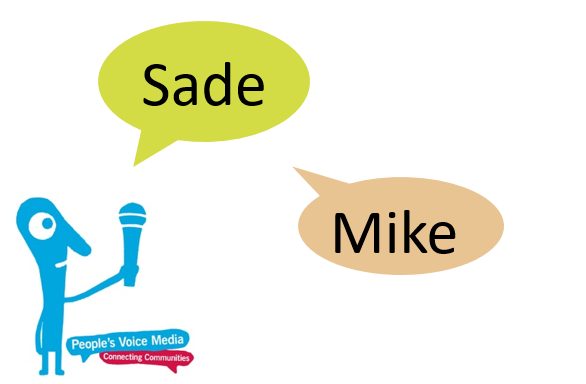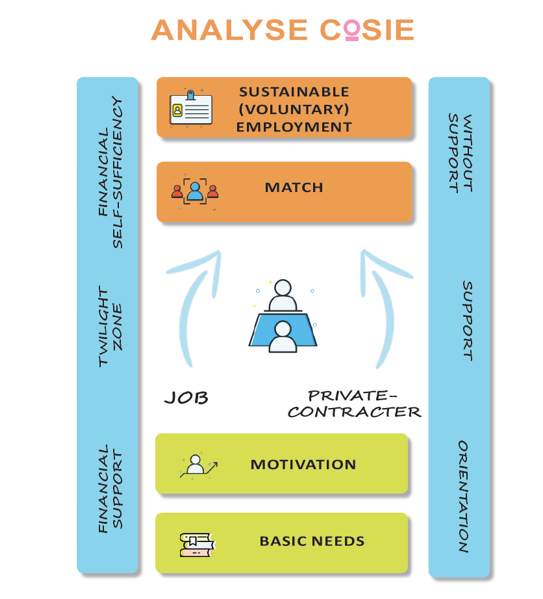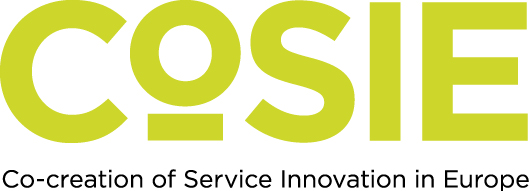Redesigning Social Services
The aim of the CoSIE pilot in Houten (within our local program of participation and inclusion), is to improve public service delivery to unemployed citizens in order to increase citizen participation in the community of Houten.
We want to:
1. Create a learning environment for users, professionals, civil servants, and other stakeholders, in order to create room for innovation and innovative behaviour and to determine what professional development is needed.
2. Strengthen the communities of users and engage them in the pilot (narratives).
3. Identify criteria for the new social services regarding participation
4. Identify where and how the present system obstructs our goal, where adjustments are needed, and what infra can be still of use.
5. Provide recommendations for spin off for other local public services.
Although currently the European labour market as a whole is doing well, and unemployment rates in the Netherlands are rather low compared to the EU average (respectively 3,6% and 6,3%), Dutch municipalities still aim at reaching a higher level of labour participation. Special attention in this context goes to finding the right match for people with a distance to the labour market.
In the Netherlands, the CoSIE project carries out a pilot in the Municipality of Houten. This municipality identified a major mismatch in the labour market: opposite each vacancy for paid work, there were ten people looking for work. This mismatch was even greater at the ‘bottom’ of the labour market. More than 3000 inhabitants of the municipality of Houten depended on benefits (long-term incapacity, unemployment and social assistance) on a working population of 25.000 people.
In our pilot, we research ways to engage citizens in the policymaking process regarding services for people with a greater distance to the labour market. We want to know more about these citizens: What elements obstruct finding suitable, decent work? What elements are considered supportive? We also want to know to what extend people are motivated to work and find out what work means to people. In short: ‘What is their story?’ The insights people give us can help the municipality to improve their public services.
The Dutch pilot therefore aims at the use of co-creation as a means to increase the chances of creating a sustainable and successful match between employer and job seeker with a distance to the labour market.
This video summarizes how the municipality of Houten tries to realize this as part of the CoSIE project.
Research Phase (January–May 2019)
- Orientation and Exploration (January – February 2019): Conversations with several stakeholder groups by conducting a series of ‘Conversation of Change’ interviews. These interviews focused on the long term goals of stakeholder groups and on how to contribute to reaching these goals with the CoSIE pilot.
- Community reporting (April–May 2019): Pilot stakeholders gathered over 30 stories from inhabitants of the municipality of Houten using open questions such as: What does work mean to you? What or who supported you in order to find work? What elements did you consider obstructive?

- Living Lab Workshop (June 2019): Workshop session to analyse local gathered data and making comparisons to data from other CoSIE partners.
- Data analysis (June 2019): Pilot stakeholders together with the academic partner watched and listened to the stories they gathered and analysed them. The analysis resulted in six central themes:
- Take peoples ‘basic needs’ in consideration.
- Support people during the phase between social benefits and a regular income (a phase citizens describe as a ‘twilight zone’).
- Focus on peoples ‘motivation’ to find a sustainable match.
- Help people to understand ‘systemic and regulatory problems’.
- Support ‘a good and personal match’ between job seekers and employers (instead of the usual vacancy descriptions and job interviews).
- ‘Support for job seekers and employers to realize a good match’.

- Conversation of change event (July 2019) In Co-creation with over 40 professionals, employers and people from the target groups we organized a ’conversation of change’ event. During the event the conclusions of the gathered stories were shared and ’challenged’ among the participants. Based on their input a basis for several co-creation experiments was made.
Co-creation Phase (September 2019 – February 2020)
Pilot 1: Information desk with native language support
In this pilot the municipality experiments with support for people from Eritrea and Syria in their national language. Support focuses on writing application letters for employers, and letters to other institutions such as the tax authorities. Also, support is given during job interviews.
Goal: increase in self-sufficiency for this target group. This effect will be analysed by comparing the scores (pre-test and post-test) of the self-sufficiency matrix (see picture below). Pilot 2: Getting grip on your twilight zone
Pilot 2: Getting grip on your twilight zone
For the second pilot we organize special co-creation sessions with citizens focusing on finding solutions for obstructive factors people face during their re-integration.
Goal: finding concrete solutions to help people getting a grip on their ‘twilight zone’, testing these solutions and translate these into tools for citizens such as an informative flow chart on the work & income web page.
Pilot 3: Using block chain for social inclusion
Together with the HU research group ‘Digital Smart Services’ and Block chain experts from the Rabobank, we explore and develop a block chain app that can be described as an ‘alternative’ for a regular curriculum vitae. The app visualizes peoples skills, norms and values in order to find an optimal ‘cultural fit’ between job seekers and employers.
Goal: this pilot focuses on the technological characteristics of the block chain technology itself, and how it can be uses in the social domain. Furthermore we use the input of involved citizens to improve the usability of the app.
Pilot 4: ‘Open house’ for job seekers
This pilot aims at a more personal connection between job seekers and employer to ‘personalize’ the job searching procedure.
Goal: organization of ‘open house’ days within several companies. During these days job seekers, employers and employees can get to know each other. In the pilot we will explore to what extent this new approach can lead to successful personal matches between job seekers and employers.
Pilot 5: Support on the work floor
In this pilot, we will experiment with intensive personal support on the work floor. Employers state they do not have enough experience and time to support specific groups.
Goal: the pilot focuses on training employers to support the needs of their employees. This will be done, in co-creation to make sure that this support will fit to the needs of the employee.
Geographic area and target groups
Citizens of Houten who wish to find a job or participate in voluntary work. Especially people with a distance to the labour market. Most of them are clients in social services (not only municipal services). Users will be involved as participants in the pilot and in the role of experience experts.
Collaborators:
Professionals, civil servants from agencies dealing with employment and social integration (work and income), as well as employers and social entrepreneurs. Professionals and agencies are involved in the change of work processes based on narratives of users. Employers an social entrepreneurs are involved to organize participation/work opportunities.
First insights
Co-creation contributes to the understanding of public service representatives regarding the complexity of the current social system: “Despite all my good intentions, I discovered that in the end I was fulfilling our agenda not the agenda of the citizens. In fact, I did not even know what their agenda was! I missed the broader perspective and the person as a whole.”
The ultimate goal of this project is to realize a ‘new narratve’, a movement in the municipalities policy making that engages its citizens (returning the ‘human factor’): “Engaging our citizens needs to be a central part of our strategic agenda in the municipality of Houten.”
At the same time, many local policies are still ‘top down’ oriented. Realizing the above goals takes time:“The idea of co-creation is contrary to ‘forcing people to meet certain deadlines’. By putting the emphasis on deadlines you undermine the opportunity for an equal partnership with citizens.”
Application of ICT (systems, apps, block chain) offers opportunities to reduce system complexities.
Learn more form lived experience stories gathered in the Dutch CoSIE pilot
CoSIE partners involved:
Houten municipality
University of Applied Sciences Utrecht
Read more about the pilot from CoSIE Blog
Paved with Good Intentions
Contact:
Jessica Dijkman, Jessica.Dijkman@houten.nl
Eva Hijmans, Eva.hijmans@hu.nl
